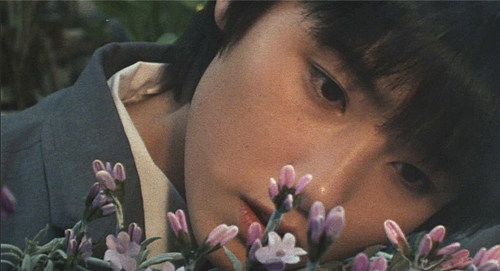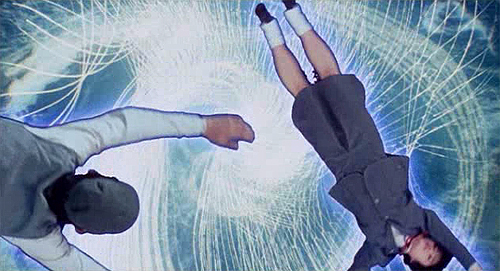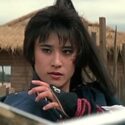The Girl Who Leapt Through Time, The Little Girl Who Conquered Time (1983)
Directed by: Nobuhiko Ôbayashi
Written by: Wataru Kenmotsu, Yasutaka Tsutsui
Starring: Ryoichi Takayanagi, Tomoyo Harada, Toshinori Omi
THE GIRL WHO LEPT THROUGH TIME (1983) Now Available from Third Window Films on Blu-ray and to Stream
Part of the Nobuhiko Obayashi’s 80s Kadokawa Years Collection
Time travel stories involving high school students are not a new concept; whether it’s something like the more well known animated version of this same story released in 2006, or a certain 1985 Robert Zemeckis movie. Katsuyuki Motohiro’s 2005 comedy Summer Time Machine Blues is a great example of this concept; using something well known as the basis for a largely frivolous tale in which paradoxes and clichés are played for laughs. Of course this 1983 drama from Obayashi pre-dates all of these takes on the idea that naive and short-sighted kids make for poor time travellers. Does it take the whole thing to some unexpected and original places, or is it simply a missed opportunity to do something creative and exciting?

In a typically dream-like opening our leading lady Kazuko (Tomoyo Harada) is out skiing with her classmates. The sentimental ‘prince charming’ of the group is Kazuo, (Ryoichi Takayanagi) a gardener who gets poetic looking up at the night’s sky. In contrast to this Goro (Toshinori Omi) is the realist of the trio who only sees celestial bodies as the balls of gas that they are. The whole sequence has a monochrome look to it; emphasising both the winter atmosphere and the potentially unreal events that are about to transpire. As the class travels to a lower altitude by train this cold aura is replaced by a warm picture-postcard vibe. Colour returns to their world and the passage of the seasons happens in front of their eyes. Which is unfortunately the last time anything clever and thematic is done through the film’s visuals.
After some classroom discussion of a song’s lyrics, notably about the time certain fruit varieties take to mature, the main bulk of the story begins to unfold. However, instead of any kind of intriguing time warp shenanigans Kazuko simply finds herself passing out in the school chemistry store room. Does she have anaemia as the teachers from the field trip suggest, or is there something more puzzling going on? Nobody actually decides to test for such a condition, so it’s unclear why they think this is the case. In fact very little (if any) investigation actually happens, in what turns out to be an excruciatingly drawn-out mystery plot. It’s also clear that despite the obvious setup for a love story very little actual character development is going to be explored. As a result the pacing of the whole thing is incredibly frustrating.
There are some vague premonition type sequences involving falling roof tiles and speeding bicycles. Some kind of future visions, or actual future events, come and go, but it’s all underwhelming. Whether your point of reference is Future Echoes or Groundhog Day, there are many examples of this kind of tale which make this subject far more compelling. It’s incredibly odd that Kazuko isn’t really that distressed or even curious about what’s going on, and it’s forty-five minutes into the movie before a major event she can change comes along. But despite the promise of some drama in the form of a fire and an earthquake, perhaps even some actual excitement, her newfound powers don’t really have any impact on these events. In fact it’s eighty minutes into the story before any actual time-travel effects are depicted, which puts into question why the film-makers wanted to adapt this story.

Of course it’s clear that Obayashi is more interested in the typical elements of teenage melodrama and sentimental romance. But a flashback scene in which Kazuko and Goro, as young children, sing the same fruit song and develop a weird blood bond, is the closest it gets to portraying friendship. The characters don’t even have that much relationship conflict, which is odd given their circumstances. Goro in particular is tied to a family business making soy sauce. He has the option to leave but probably never will, while his other friends are likely to drift away and leave town as they get older. Doomed careers and ideas about fate are a ripe subject for a story dealing with changing the flow of time… but instead it never really asks any serious questions or does anything dramatic.
The main problem with the narrative, beyond the way it takes forever to inevitably circle back to the chemistry lab, is the character motivations. Goro is the everyman who always wants to please his family, which is relatable enough. But the other part of the supposed love triangle, Kazuo, is a strange figure with frequently vague motivations. Which is to say, without getting into any spoilers, that he’s got a goal in mind but has gone about it in the dumbest way possible. When things like tearing the very fabric of time and messing with everyone’s brainwaves start to become an issue it makes him look even worse. The whole thing is often pretty glacial but last minute twists about why this has all been going on undo any sense of internal logic the movie might have had until that point.
Time loop movies can be incredibly fun, whether they’re the kind in which the same events keep unfolding, or the kind in which characters go back and forward, experiencing the same day from different perspectives. But this barely does anything with the concept in terms of interesting themes or actual drama. The protagonist is weirdly inert; being either too confused or too uninterested to use her reality shifting powers for selfish or honourable deeds. Instead she’s more of an observer and her ultimate choice of who to fall in love with seems both shallow and unearned. Dilemmas like erasing yourself from existence, accidentally changing history, or even cascading butterfly-effect situations are barely touched upon. It’s occasionally visually interesting, sometimes cute, but overall it’s a weak example of a well worn series of tropes you can enjoy elsewhere.







Be the first to comment